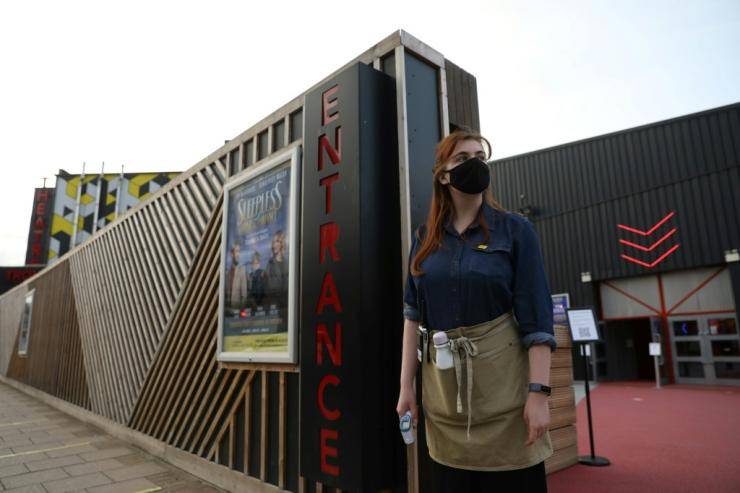London stage creeps back to life

Stay tuned with 24 News HD Android App

Claire Hutton is excited about stepping foot in a theatre for the first time since the coronavirus brought the curtain down on live shows in London in March.
"I missed it," she admitted, as she waited to watch the musical "Sleepless", the first major production launched in the British capital since restrictions were partially lifted.
"I missed the whole experience, even the meal before the show, going to the stage door after the show," the 36-year-old told AFP.
For self-confessed "massive theatre fans" like Hutton, who was wearing a T-shirt with the slogan "The Show Must Go On", the six-month wait to see live performances has been hard.
But measures to keep audiences safe aren't a deterrent.
At the Troubadour, in Wembley Park, northwest London, on Thursday night, theatre-goers had their temperatures taken and were told to wear face masks throughout the performance.
Most British theatres are still closed but the pop-up venue in the shadow of the colourful landmark arch of the national stadium has been able to adapt to social distancing rules.
Its 1,200 capacity has been cut to 400 seats, and a one-way route has been put in place along with hand-washing and disinfecting facilities.
The audience didn't seem to mind.
"For a couple of hours, it's OK," said Joe Spiteri about the mask requirements. "Then it goes itchy," he added.
Precautions are taken backstage too. Every day, the production team has a saliva test to determine if they have the virus. Results come back within 45 minutes.
- 'Give us a date!' -
"We're doing more than anyone else to keep people safe within the venue," said Rowley Gregg, chief operations officer of Troubadour Theatres.
"We're the only major theatre performance that is putting on a show of this size. You may see that there's other performances with one individual on stage.
"But for this, it's a full-on production with 20 to 25 cast members."
Gregg conceded that an ideal situation would be to have more numbers to help profit margins but said it was a vital step "to prove... that there is light at the end of the tunnel".
The situation at the Troubadour contrasts sharply with London's West End theatre district just 10 miles (16 kilometres) away.
Hit musicals such as "The Lion King", "Hamilton" or "The Phantom of the Opera" have still not resumed, and tourists who buy most seats are absent.
Outdoor theatre and streaming of shows has been happening but difficulties in enforcing social distancing in older indoor venues, and the effect on bottom lines, is a hindrance.
"We're at the point of no return," British composer and theatre impresario Andrew Lloyd-Webber told a parliamentary culture committee earlier this week.
"We simply have to get our arts sector back open and running," he added, outlining the huge effects on performers and production crews alike.
An acquaintance, "one of the finest viola players I know", was now working at a supermarket to make ends meet, he told lawmakers.
"There comes a point now when we really can't go on much more," he said, urging the government to commit to a firm timetable for reopening. "Give us a date!"
- Debt and lay-offs -
Lloyd-Webber's own production of "Cinderella" that was scheduled to have opened in the coming months, has now been put back until next year.
Theatre closures have forced venues to lay off staff and gone into debt to survive. Others have simply gone to the wall.
The prestigious Royal Albert Hall has taken out £10 million (nearly £13 million, 11 million euros) in loans, and put 80 percent of staff on furlough.
Overall, theatres and concert venues are facing a £3-billion shortfall in revenues this year, a hit of more than 60 percent, a study by Oxford Economics predicted in June.
But plans to reopen more public events have now been put on hold, as infection rates surge again and approach nearly 3,000 positive cases per day.
Prime Minister Boris Johnson has tried to inject some hope by outlining plans for a huge increase in rapid testing, which would allow those who test negative to take their seats.
